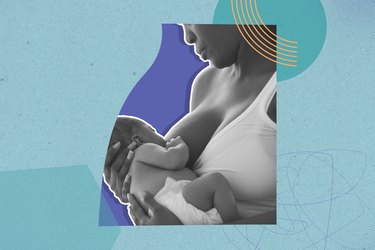
It's no secret that pregnancy and childbirth transform a person's body in major ways. But for many of us, that's just the first part of the story. If you go on to breastfeed — whether it's for a few weeks, a few months or a few years — your body will continue to be different than it was before. After all, it's providing all (or most) of the nutrition your little one needs, and that's no easy task.
Breastfeeding is a full-body-and-mind experience. Your hormones shift, your metabolism changes, your sleep schedule is all over the place and your body starts to sync up with your baby's needs in surprising ways. For example, sometimes hearing your baby cry — or even just thinking of them — will cause you to start leaking milk (you can blame the "letdown reflex" for this).
Video of the Day
Video of the Day
Let's take a deep dive into what happens to your body when you breastfeed, including breastfeeding hormone side effects along with what happens to your breasts, your metabolism, your periods, your sex drive and more.
1. Your Brain Floods With Oxytocin and Prolactin
There are two major hormones involved in breastfeeding: prolactin and oxytocin. Prolactin regulates your milk supply and causes your body to make milk. Oxytocin causes the milk to be ejected from the breast and flow into your baby's mouth.
Usually when we think about the side effects of breastfeeding hormones, we are thinking of oxytocin, which can have some pretty powerful effects on your mood and emotions. "Oxytocin is sometimes called the 'feel good' hormone," says Cindy Rubin, MD, IBCLC, pediatrician and breastfeeding medicine specialist at In Touch Pediatrics and Lactation. "It can lead to a feeling of comfort and calm that helps with baby bonding."
But it's not just oxytocin that affects your wellbeing: Prolactin has some powerful effects as well.
"Prolactin, involved in milk production and release, helps to induce sleep," says Jessica Madden, MD, IBCLC, pediatrician, neonatologist, lactation consultant and the medical director of Aeroflow Breastpumps.
This can be helpful during those middle-of-the-night feeds, and is part of the reason why a March 2014 study in the Journal of Clinical Sleep Medicine found that exclusively breastfeeding parents actually end up getting more sleep than parents who don't breastfeed, despite their frequent night wakings.
2. You Might Experience Negative Emotions, Too
Breastfeeding hormones don't only produce positive feelings, though. Sometimes people experience negative emotions when their milk lets down (begins to flow). "They can feel overwhelmingly depressed, a feeling of doom or even nausea," Dr. Rubin says.
This is due to a phenomenon known as Dysphoric Milk Ejection Reflex or DMER. "We think it is related to a decrease in the hormone dopamine during this process," Dr. Rubin says.
DMER can be extremely distressing and may even lead to early weaning. "I find that simply knowing that DMER is real can be a huge comfort to parents who experience this," Dr. Rubin says. "I recommend anyone experiencing this reach out to a breastfeeding professional because there are ways to treat it, and it also often dissipates with time."
3. Your Milk Ducts Kick Into Gear
You're probably well aware of some of the outward changes that happened to your breasts during pregnancy. Most people notice their breasts growing a cup or two sizes larger, their breasts may get super sore and their nipples and veins may look darker, according to a 2020 review in Advances in Experimental Medicine and Biology.
But there's a whole lot going on inside your breasts, too — both during pregnancy, and in the first few days and weeks of breastfeeding.
Your breasts start to increase in volume and size about midway through pregnancy due to a hormone called progesterone, says Dr. Rubin. "Progesterone triggers the development of milk ducts and alveoli (the cells that make and secrete milk)," she explains. "Once birth occurs and the placenta is delivered, progesterone levels rapidly decrease."
This drop in progesterone causes prolactin and oxytocin to surge, which is when your breasts get to do what they've been waiting to do — start the incredible process of milk production.
4. Your Breasts Get Full and Tingly
Even though your full milk supply doesn't come in for a few days after birth, you actually already started to produce your baby's first milk — colostrum — during mid-pregnancy. This milk is available to your baby for the first few days after giving birth, before the hormonal shift happens and full-on milk production begins.
Once your milk starts to come in (usually two to four days after birth), you'll start to notice a whole bunch of changes. "At this point, some parents experience a period of engorgement, when the breasts feel very full and uncomfortable, but this is typically brief and improves after 48 to 72 hours," says Dr. Rubin.
After that, your breasts will usually feel fuller when it's time for your baby to eat, and softer when they are done.
"You may also feel a sensation in your breasts when your milk 'lets down' or starts to flow during each feeding," Dr. Rubin notes. This can feel different from person to person, but many people describe it as tingling or "pins-and-needles" sensation.
But not everyone "feels" their let-downs, and if you don't, that doesn't mean you aren't producing milk.
5. You Might Experience Some Aches and Pains
Some of the side effects of breastfeeding might involve a bit of body discomfort. In the early days, you may experience nipple pain or sensitivity as your body adjusts to breastfeeding, according to WIC Breastfeeding Support.
But pain that lasts throughout a breastfeeding session or that causes your nipples to be cracked, bleeding or misshapen is not normal. Thankfully, just a few tweaks to your latching and positioning is usually all it takes to fix these issues. (An international board-certified lactation consultant can help with that; search for one near you using USLCA's Find an IBCLC Directory.)
Speaking of breastfeeding positioning, some people deal with breastfeeding-related muscle weakness or soreness. This is usually due to the way you are holding your baby at the breast. If you are hunched over your baby while breastfeeding, you can experience backaches or a sore neck and shoulders. Leaning back a little while breastfeeding, putting your feet up and getting support for your arms while you hold your little one can help with these issues.
6. Your Metabolism Changes
Often, people tout postpartum weight loss as a benefit of breastfeeding. The truth is a little more complicated than that. Yes, your metabolism is altered during breastfeeding, and you are burning more calories than you did before you were pregnant, per a February 2014 paper in Current Diabetes Reports. But that doesn't always mean you will lose weight, says Dr. Rubin.
"Some people lose weight while breastfeeding (especially if they are having a hard time keeping up with their increased calorie needs), but some people gain weight," Dr. Rubin says. The reasons aren't entirely clear, as there's a lack of research in this area, but it likely comes down to the hormones released during breastfeeding, which can affect each person differently.
"Either way, it's important to know that your body will likely be different after having a baby, with or without lactation, and may never be exactly the same as it was before having a baby," Dr. Rubin says.
Dr. Rubin's advice? Be patient with yourself and your body. (Here are 11 small ways to practice self-care when you're breastfeeding.)
7. Bone Loss May Occur (but It’s Temporary)
You may have heard all kinds of scary-sounding info about breastfeeding causing bone loss. Bone loss actually starts in pregnancy. During the first three months or so, your baby requires a ton of calcium to grow their own skeleton and will use your own stores to do so, according to the NIH Osteoporosis and Related Bone Diseases National Resource Center. Not all parents experience bone loss during pregnancy, though, and if they do, it's restored within a few months after delivery.
If you are breastfeeding, it may take a bit longer for any bone loss to be restored. Research has found that breastfeeding folks may lose 3 to 5 percent of their bone mass, per the NIH. This is likely due to your baby requiring calcium for growth, and may also occur because of low estrogen levels experienced during breastfeeding.
Either way, your bone mass is restored after weaning, and there are no known long-term effects of breastfeeding on your bones.
What's more: Making sure to consume adequate amounts of calcium (about 1,000 milligrams per day, per the NIH) during breastfeeding may offset some of these effects.
8. You Might Feel Hungrier and Thirstier
During your baby's first six months, you will require an additional 400 to 500 calories a day to make milk, per the February 2014 paper in Current Diabetes Reports. Not surprisingly, then, you will definitely be hungrier when you breastfeed, says Dr. Rubin. She recommends listening to your hunger cues and expecting to eat frequently.
"It's important for a breast/chestfeeding person to eat regular meals and have a variety of snacks on hand to munch on in between meals," she says. (And keep in mind that certain foods can boost your milk supply.)
You will also find yourself very thirsty. "A lactating person is also losing more fluids every day (in the form of milk) and therefore needs to drink frequently to keep up their hydration," Dr. Rubin says. "There is no exact science, but a good rule of thumb is to drink a glass of water every time you nurse or pump."
9. You May 'Lose' Your Period (and Sex Drive) for a While
During breastfeeding, your body is in a low estrogen state, Dr. Rubin says. This can lead to a few different symptoms, including vaginal dryness and a decreased sex drive.
One of the most notable symptoms is that you will likely not have a period for a few months. According to the American College of Obstetricians and Gynecologists (ACOG), ovulation is usually delayed for about six months during breastfeeding, and your first menstrual period usually starts about two weeks after you ovulate. (Everyone is different, though — some people may get their period back a few weeks after birth, while others might not ovulate again until they've completely weaned from breastfeeding.)
Many people find that once they start ovulating and having periods again, their sex drive comes back, along with vaginal lubrication. But our sex drives aren't just affected by hormones. Being an exhausted parent can decrease your sex drive, whether you are breastfeeding or not. This is normal, and like everything else, this too shall pass.
10. You May Feel Depressed During Weaning
Perhaps the most unexpected change that happens to your body occurs when breastfeeding ends. "I think a lot of parents are surprised by all of the emotions that emerge during weaning from breastfeeding," says Dr. Madden. "No matter when weaning occurs, drops in prolactin and oxytocin that occur during weaning can lead to feelings of sadness and depression."
Sometimes these feelings can be hard to differentiate from postpartum depression, says Dr. Madden, so she encourages parents who are experiencing any difficult feelings during weaning to discuss this with their provider or loved ones. "This emotional imbalance may not last very long, but it can be severe and take one by surprise," she says.
The Bottom Line
The changes your body undergoes during breastfeeding can be exciting, exhausting, startling, strange, uncomfortable and awe-inspiring. It's a mixed bag, for sure! It's totally normal to have questions about what is going on with your body, and it's also common to need a little help along the way as you breastfeed your little one.
If you have any questions or concerns about breastfeeding or what is happening to your body while you nurse, reach out to your ob-gyn, midwife or a board-certified lactation consultant.
- National Library of Medicine: "The Physiological Basis of Breastfeeding"
- National Library of Medicine: "Physiology, Breast Milk"
- American College of Obstetricians and Gynecologists: "Postpartum Birth Control"
- Current Diabetes Reports: "Impact of Breastfeeding on Maternal Metabolism: Implications for Women with Gestational Diabetes"
- NIH Osteoporosis and Related Bone Diseases National Resource Center: "Pregnancy, Breastfeeding and Bone Health"
- Academy of American Pediatrics: "Positions for Breastfeeding"
- USDA WIC Breastfeeding Support: "Help for Sore Nipples"
- Advances in Experimental Medicine and Biology: "Anatomy and Physiology of the Breast During Pregnancy and Lactation"
- Journal of Clinical Sleep Medicine: "Nighttime breastfeeding behavior is associated with more nocturnal sleep among first-time mothers at one month postpartum"
- Breastfeeding Medicine: "Dysphoric Milk Ejection Reflex: A Descriptive Study"
Is this an emergency? If you are experiencing serious medical symptoms, please see the National Library of Medicine’s list of signs you need emergency medical attention or call 911.



